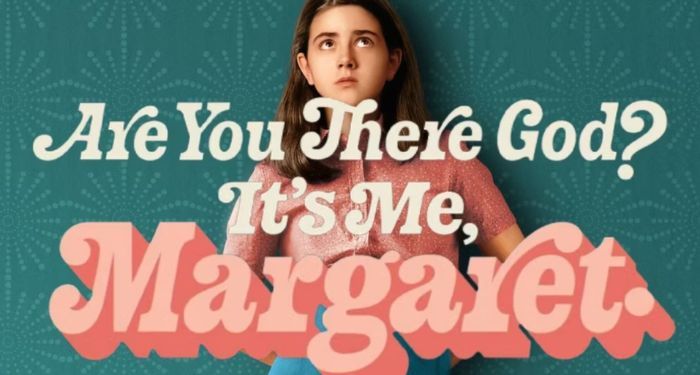Are You There God? It’s Me, Margaret is one of the only books by beloved author Judy Blume to be adapted to screen. And despite needing to wait over 50 years for it to arrive, it is worth the wait and will be an intergenerational viewing experience for decades to come.
Directed by Kelly Fremon Craig, God is a quiet story that resonates deeply — even if (or maybe even because) it does not pack high-action, a swift pace, or special effects to make it sexy. If anything, it’s this stripped down adaptation that gets to the point: this is going to be a story focused on a young girl’s coming-of-age and all of the challenging complexities which come from just that.
God published in 1970, and the adaptation keeps this time period. The film opens with Margaret Simon (Abby Ryder Forston), returning home to New York City from summer camp. As she hops off the bus to her parents Barbara and Herb, played by Rachel McAdams and Benny Safdie, Margaret immediate suspects something is off because they are not as spirited as she knows them to be. This wasn’t the welcome back she anticipated. It is her spitfire grandmother Sylvia (Kathy Bates) who spills the beans when the family returns to their apartment: Margaret and her parents will be moving to the suburbs.
Margaret, who is 11, is immediately greeted in her new New Jersey community by 11-year-old Nancy Wheeler, who heard about Margaret’s arrival via the local realtor. Quickly, though, Margaret and the viewer know that Nancy is not good news. She is judgmental, suggesting that the reason the bathing suit Margaret borrowed from her does not look as good on her as it does Nancy is because she’d not yet grown breasts; she is quick to form alliances and secret clubs, telling Margaret that in order to join her and her friends, she needed to go to school the first day without socks or she would not be cool (the subsequent shot of Margaret’s blistered heels garnered a theater of laugh-gasps); and she is quick to lie, telling Margaret that their classmate Laura is fast and loose, open to being felt up behind the local convenience store by older boys because she has gone through puberty already. Viewers see Margaret flinching through each declaration.
Margaret recognizes immediately that befriending Nancy, as well as her friends Janie (Amari Alexis Price) and Gretchen (Katherine Kupferer), will make for an easier transition to her new school. Being friendly with Nancy also means seeing Moose, who plays the role of Margaret’s first crush.
The first day of school ends with Margaret attending the first club meeting Nancy proposes with their quad of girls. As they go around the table, sipping on Tab, each lays out the rule they believe everyone should follow to remain in the club: they must wear a bra, they must keep a list of boys they like, they must spill all of the details when they get their first period, and they must tell no one about their club.
It’s Fight Club for pubescent girls.

God is a slice-of-life story, and it excels at just that. Margaret grew up in an interfaith household, and yet, has always prayed to a non-denominational God figure. She is encouraged through her teacher Mr. Benedict (Echo Kellum) to pursue religion as her year-long research project, and when she brings it up with her mother, Margaret begins to feel both overwhelmed by opportunity to discover and disheartened by the ways capital-R Religion can be a cudgel between people.
Blume was a forerunner in approaching big, meaty topics in her books for young readers, and despite being in print for over 50 years, Are You There God? It’s Me, Margaret continues to feel contemporary, fresh, and relevant. Over the years, she has updated the text, utilizing more updated language and references — what was once a sanitary pad affixed with a belt has become a brand of pads called “Teenage Softies.” But what hasn’t changed are the very real struggles young people experience. In a world where big, flashy stories are those which garner headlines and rave reviews, God soars because it does just the opposite: it takes the big story down to the individual level, showcasing the ways internal stories are just as earth-shattering and life-defining.
On a very basic level, what distinguishes a young adult story from a middle grade story is the driving force or takeaway for the central protagonist. In young adult, that character’s world is expanding: they look outward, wondering where they fit into the grander universe, how they can push back against the systems. In middle grade, character’s concerns relate to themselves and their self-discovery: what do they learn about themselves?
Are You There God? It’s Me, Margaret is the quintessential middle grade story. Margaret does not want to change the systems of religion, nor does she want to fight the sexism or gendered stereotypes she’ll encounter as she moves through puberty — at least, not yet. Instead, Margaret wants to know the why and how of these experiences in relation to herself; her attempt to find justice in a broken and hurting world centers on her immediate orbit and how it relates back to her. Why did her mother’s parents disown her mother because she married a Jewish man? Why can’t she get her period before her friends? Why does she need to be mean to Laura, just because Nancy told her to?
And just who is she at all?

Blume’s story is timeless, and the ’70s setting, style, and music used throughout help establish it as one that is also ageless. Unlike some of Blume’s books, like Forever . . ., where teens passed the text between one another, Are You There God? It’s Me Margaret is the kind of story passed from adult to child. The adaptation has wide appeal and offers a unique opportunity to enjoy a story that resonates both with adults who’ve been there, as well as young people who are in the thick of it.
This adaptation shines in its rendering of change and transition. Barbara Simon goes from career woman to stay-at-home mom in following the move, and her struggles to adapt from being constantly on the go to finding herself bored to tears is potent. She struggles not only in finding meaning — volunteering for one too many school PTA committees overseen by Nancy’s overbearing mother — but she worries about how to engage with Margaret in truthful, but sometimes painful, conversations. She messes up several times throughout, but each time, she humbles herself and owns the mistakes and harm she’s made. Barbara has a satisfying arc through the film not given to her in the original text (it is written for tweens, after all) that elevates her role both in the life of her daughter and her own.
We see a similar growth in Mr. Benedict, a Black teacher in his first year of class. He is nervous at the start, but over the year, viewers are treated to a teacher truly coming into his own style and making powerful connections with his students. Margaret points this out to him, too, in one of the film’s final scenes, and it is a reminder of the powerful role an educator can — and does — play in the role of their students when given the opportunity.

Even grandma Sylvia gets a fully developed arc throughout the story. While she misses Margaret — to the point of calling her nearly every day immediately after school lets out — slowly but surely, she begins to cultivate a life of her own. She not only travels, but she begins a romantic relationship with a man she meets at a senior center in Florida. Bates was the perfect performer for the role, which offers opportunities for laugh-out-loud humor, for frustration, for spoiling her only granddaughter, and for getting straight to the point when other adults want to speak in euphemisms.
Are You There God? It’s Me, Margaret reflects the diverse reality of that era (and our own!) in its casting. Margaret’s classroom features students of every background, and Janie, one of the girls who Margaret becomes closest with, is Black. Her experiences growing up as a Black tween are showcased right alongside those of her white peers. In a montage of preparing for a class party, Janie is shown getting her hair washed in the kitchen sink, followed by a comb being placed on the stovetop to be used for styling.

Ryder Forston’s portrayal of Margaret is top-notch and reminiscent of a young Winnie Cooper — the character, not the actor behind it. Like most young performers, she’s older than the titular character, but being 15, she is close enough to the experiences in the film that it is hard to believe she isn’t 12…and also has not been in the business for 20+ years. McAdams’s Barbara is also noteworthy, and it would not be surprising to see her becoming an aesthetic icon for summer 2023, much like The Parent Trap‘s Chessy has in recent years.
Because this is a movie that centers on girls’ stories, reviews of this title are already showing their hand in their sexism. Variety called it “edgeless,” suggesting that it has been blunted from the original book — the writer must not have reread the book before hand — and “cute” is bound to proliferate future reviews, diminishing the importance of quiet stories such as these. World of Reel called it “too tidily assembled,” while The Wrap gives it the diminutive praise of “darling.”
Can’t a girl or a woman get a story centering them without it being cute, neat, or without edge?
In a world where we’ve become obsessed with bigger, flashier, brighter, faster, it’s movies like Are You There God? It’s Me, Margaret that we need to reiterate that sometimes the most important, life-altering stories are those which happen within ourselves.
No special effects needed.

The film is in theaters now. Savvy viewers will enjoy the fun cameo by author Judy Blume, too.


